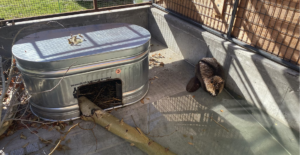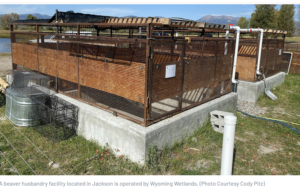In 15 years of beaver watching I’ve become more disillusioned about relocation. Too often it involves risk: whether in the housing unit, without protection once released. or in the spaces their expected to settle. Does it work? Sometimes. Is it worth it? Sometimes. Is it kinder than killing the beavers outright? Sometimes.
When I think about relocation I remember what the elves told Frodo about advice. “Advice is a dangerous gift even from the wise to the wise.”
Besides the risk there’s the futility. The landowner who wants these beavers gone will just get new ones soon. Better to fix a problem than to move it.
Wyoming Halfway House Rehabilitates Instead Of Kills Delinquent Beavers
 A halfway house for delinquent beavers is under construction at the Wyoming Game and Fish facility in Cody.
A halfway house for delinquent beavers is under construction at the Wyoming Game and Fish facility in Cody.
The beavers that will be temporarily housed there aren’t hardened criminals, they’re just doing the job nature intended them to do. But that work often includes knocking down shade trees around homes, building dams and sometimes plugging culverts and flooding roads.
What makes beavers a nuisance is when their work conflicts with civilization. This new relocation facility will temporarily house them until they can be moved to more suitable neighborhoods.
Jenny DeSarro, executive director of Wyoming Untrapped, a Jackson non-profit, said beavers provide a “huge” ecological value to Wyoming.
“We feel like it’s a win-win for everybody when we can keep beavers on the landscape,” she said. “Beaver relocation is a better alternative to lethal removal.”
DeSarro said beavers help replenish aquifers and create habitat for many other animals including moose, waterfowl and fish.
Wyoming Untrapped contributed about $10,000 to the construction of the new facility. It is expected to be open for business by next spring, she said.
Yes they do all that. but they will have to do it somewhere else because Mr. Smith doesn’t want his aquifer recharged or to see more birds on his property. Beavers are only permitted to replenish CERTAIN aquifers…Understand?
Cody Pitz is a wildlife biologist and beaver expert for the Jackson non-profit, Wyoming Wetlands. Pitz is the warden for the non-profit’s own beaver jailhouse located near Jackson. The facility opened last spring and has since provided temporary housing for about 30 beavers, he said.
 The relocation facility can hold four family groups, which can include as many as ten animals each. It’s important for the relocation process to keep the families whole as much as possible, he said. That way they tend to stay together after a suitable place for relocation is found.
The relocation facility can hold four family groups, which can include as many as ten animals each. It’s important for the relocation process to keep the families whole as much as possible, he said. That way they tend to stay together after a suitable place for relocation is found.
The Wyoming Wetlands facility has four 330-gallon pools of water for the beavers to use and keep cool during hot weather. Pitz said beavers don’t perspire so keeping them shaded and providing water prevents overheating.
The facility also has steel dens for the beavers to live in and to help recapture them for relocation.
“How it works is we take nuisance animals that would otherwise be killed and we offer to live trap them and relocate them,” he said. “We work with Wyoming Game and Fish and the Bridger-Teton National Forest to relocate them farther away from people.”
Pitz said they are careful in selecting proper areas for relocation to avoid future conflicts.
“We are not just deciding on our own where to relocate nuisance beavers,” he said. “We work with government agencies in deciding where they (beavers) are needed.”
Wyoming Wetlands also works with local landscapers to obtain aspen trees to feed the captive beavers. Aspen is their favorite food, but Pitz said they also eat apples, squash, corn and potatoes.
The non-profit contracts with local trappers who catch problem beavers in live traps.
I’m always a little comforted by an effort to locate family groups but still…it’s hard work for the beavers. And a lot of work for the humans.
The new beaver husbandry facility in Cody is designed with three primary considerations. First is efficiency of handling with minimal stress to the animals. Second is the well-being of the animals while they are in captivity and third is ease of maintenance and cleaning.
According to Wyoming Untrapped, the facility will include four fenced units, each consisting of a fenced concrete raceway, a feeding area and a den. A concrete den with underwater access will be constructed at the end of each raceway. The dens are lined with a removeable steel crate in order to remove beavers for transport.
Cody is an ideal location for the facility because it’s located in an area where conflicts between beavers and people consistently occurr. It has the potential to provide a source of beavers for adjacent regions as well, according to Wyoming Untrapped.
“The project would serve as a pilot to demonstrate the efficacy of this approach with the long-term goal of establishing other facilities in strategic locations in the state,” according to Wyoming Untrapped.
Other partners in the $80,000 project include Wyoming Tourism for Tomorrow and Mary Rumsey.
Every person I know who has really researched this issue is kind of iffy on its benefit. Vanessa Petro says the relocation is more likely to be successful when the beaver is moved within the same watershed, but how often does does that occur?
To paraphrase Tolkein: Beaver relocation is a dangerous gift even when done by the careful for the caring.






































